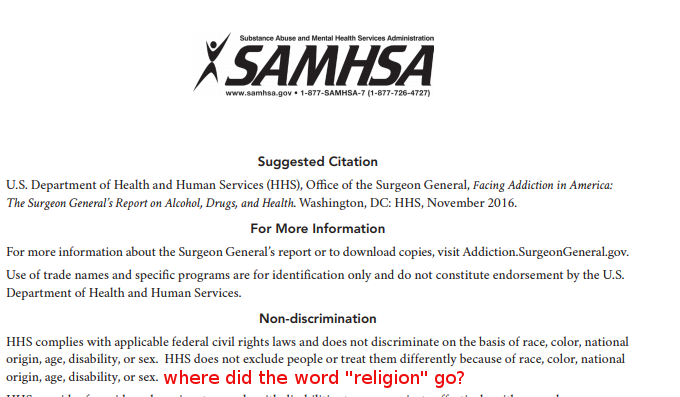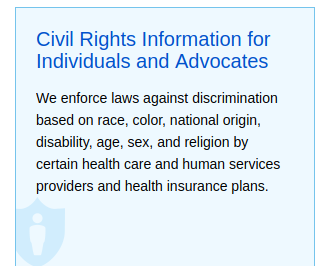It’s time to stop seeing Anti-AA activists as government conspiracy theorists and take a close look at how government works.
This is the HHS OCR’s notice at the beginning of the Surgeon General’s report:
When I filed my complaint, I saw this:
and then when I asked about it, i got this weird response that it depended on who funded it.
Government is staffed by people with ideological and financial interests. They create laws that regulate or refuse to regulate industries based on private interests. The purpose of checks and balances is to protect the public from unjust law.
The US Constitution states “Congress shall make no law respecting an establishment of religion, or prohibiting the free exercise thereof…”
The anecdote in this article is significant in that there was a clear case to be made that the state was establishing religious indoctrination by mandating Alcoholics Anonymous attendance, but due to personal and group political interests, eyes were averted from this violation of the Establishment Clause.
It is expected and understandable that people entrusted to wisely allocate public funds, and with the regulatory power to license or de-license professionals endorsed by the state will bring their personal beliefs into the equation.
The judicial branch of government protects the public from policy-makers acting unfairly in their own interests to the detriment of society. Judges can only get involved if the case is brought to their attention. A group like the ACLU is obligated by their own promises to bring these cases to the courts. In this case, it is fairly clear that the opportunity was missed, and the consequence has been the increasing ability for government agencies to protect, promote, and fund the establishment of the 12-step cult religion.
Atheist Challenges Order to Attend Alcoholics Anonymous Meetings
One ACLU lawyer neglected to attack AA under the the Establishment clause and later admitted she was an AA member.
“[Ellen, that’s when we first began to disagree. You wanted to stick with a free exercise clause argument. I wanted you to include the establishment clause. I felt some satisfaction when Jack Schwartz, the AG’s assistant, asked you why you weren’t arguing the establishment clause. You got mad at me and became stubborn. I later realized you didn’t want to endanger people’s access to AA. Later you told me, as if in a confession, that you’d gone to AA for quite a while. You seemed surprised that I didn’t care. We disagreed on a lot of things after that. That’s something I always valued in our relationship. That we could disagree and get angry at one another and still be friends.]” -Jeffrey A. Schaler, Ph.D.
“As an attorney for the American Civil Liberties Union in Maryland, Ms. Luff successfully argued in 1988 that court-ordered attendance at meetings of Alcoholics Anonymous violated the First Amendment of the U.S. Constitution, which guarantees religious freedom.”
– From the Washington Post Obit.
Elements of the Surgeon General’s report on Facing Addiction suggest that the Department of Health and Human Services needs to be brought to court for neglecting concern for civil rights related to religion.

